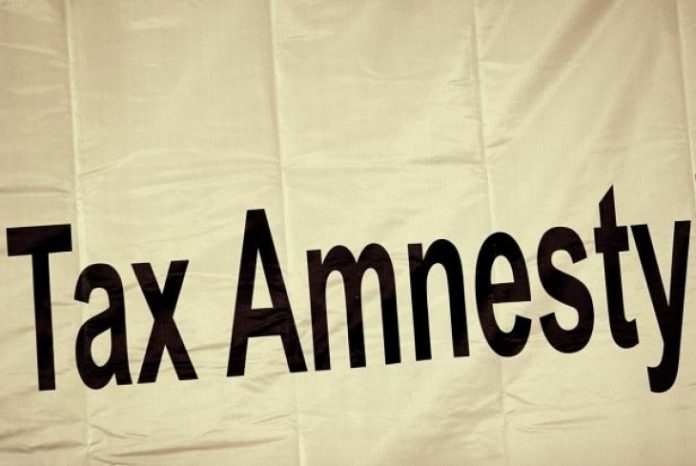ISLAMABAD: Terming it an unwise decision of the government to introduce the tax amnesty at a time when the ruling party is going to complete its term in less than two months, experts claim that the amnesty will be an exercise in futility as the same is technically not viable.
The tax amnesty will be violating many existing laws and acts regarding accountability, anti-money laundering and corruption. The government first needs to change such laws through making amendments to the constitution, which seems very difficult for the ruling party that is lacking a majority in the Senate, experts told Pakistan Today.
“The Lahore High court has recently given its verdict against an amnesty scheme introduced in 2013. The upcoming scheme too will easily be challenged in the courts,” said Federal Board of Revenue (FBR) former chairman Dr Muhammad Irshad adding that courts may not allow a tax NRO in the country.
“The amnesty scheme was in process when I was FBR chairman in 2016. The government had initiated work on it and the tax reform commission was assigned the task to make draft for the amnesty scheme. The same was presented to me as it was to be introduced by FBR. However, the government could not launch it because of various reasons,” he said adding that the government after seeing the experience of Indonesia, had decided to introduce the amnesty scheme in Pakistan. “We held various secret meetings and talks on the issue but to no avail. The actual issue was related to the rate of penalty, which we had suggested to be not less than 10 per cent. But surprisingly the government has now set it at only 2 per cent. Indonesia, which set 10 per cent penalty has made over $21 billion in revenue through such scheme,” Dr Irshad said.
“It was high time to introduce such scheme in 2016 when there was much hype regarding the Panamagate scandal. Pakistan could have forced its people to get money back to the country through such a scheme but at the same time giving good share to the government,” he added.
“Since we missed the opportunity, we need not go for such a scheme couple of weeks ahead of the next budget. Actually, the government is taking such step in acute frustration and under the immense pressure of current account deficits as no one including IMF is ready to give a loan to the government,” he said.
According to him, the amnesty scheme now is an exercise in futility. No one will take a risk of bringing back his illegal money to Pakistan when the political parties like Pakistan Tehrik-e-Insaf (PTI), aspirant to form next government, is strongly opposing the scheme. “The most inappropriate element in the announced amnesty scheme is related to increasing the limit and threshold of tax exemption on annual income up to Rs1.2 million. This will ultimately reduce the number of taxpayers by 500,000 from the existing 1.2 million. How can we justify the number of taxpayers (nearly 700,000 after this scheme) against the 210 million people of the country?” he said.
In reply to a query, he said, FBR has completely been sidelined in the entire process. “Unfortunately FBR, under the present situation, is toothless and a dummy organisation only completing paper worth of taxation,” he said.
Talking to Pakistan Today, Sustainable Development Policy Institute Joint Executive Director Dr Vaqar Ahmed said that many acts and existing rules would be violated by the tax amnesty. Until the scheme has a legal cover through a constitutional amendment, it will not be viable.
According to him instead of embarking towards yet another tax amnesty scheme, the government should make the utmost efforts to operationalise the already signed cooperation agreements with countries where ill-gotten wealth exists. For example, under Article 25(1) of the Avoidance of Double Taxation Treaty with Switzerland, Pakistan can seek information regarding nationals maintaining financial wealth in former’s banks. A repatriation of this wealth is also possible under the same law.
It is also believed that if Pakistan embarks towards amnesty scheme and weakening of accountability laws in the country by providing immunity to certain individuals this could in turn weaken Pakistan’s case with the Financial Action Taskforce.
It may be noted that even in other countries which have announced amnesty from time-to-time, nationals had declared wealth but they did not bring it back to the home country (in the amounts anticipated). Similarly, in Pakistan, there is a need to first carry out an evaluation as to why past tax amnesty schemes failed.
As per an official at FBR, the organisation has strong reservations over the amnesty scheme. This is why neither Special Assistant to Prime Minister on Revenue Haroon Akhtar nor FBR Chairman Tariq Pasha attended the press briefing of the prime minister about the new scheme.
“It seems that ruling party has decided to leave a deteriorated economic position to be faced by the next government. The government also knows that scheme will not attract much black money from outside except those who wished to avoid the ongoing legal actions of NAB and the judiciary in Pakistan,” said an economist on terms of anonymity.
Talking to Pakistan Today, former finance secretary Dr Waqar Masood, said that there would be many difficulties in the execution of such a scheme. The ordinance related to tax amnesty could be quashed through a resolution of assembly and the Senate.
























